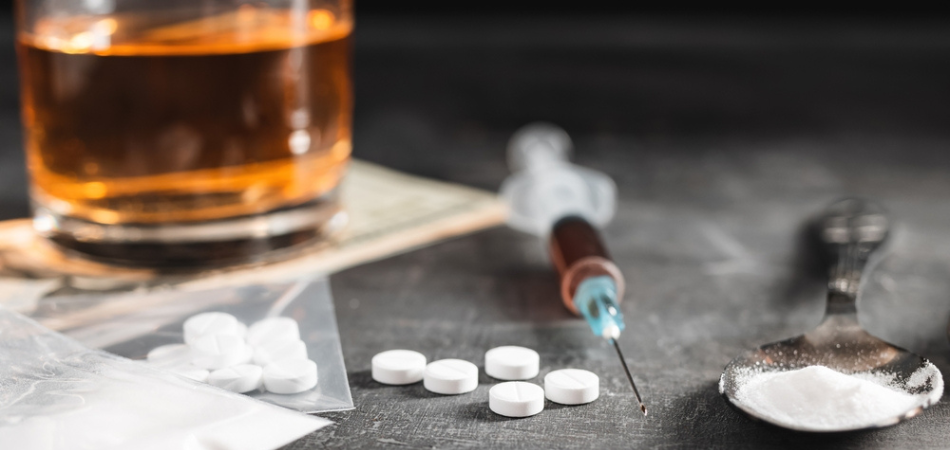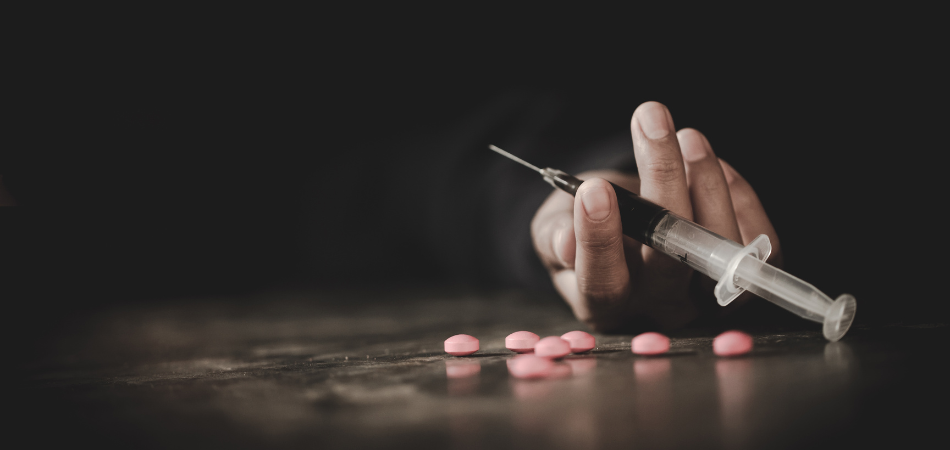Drug overdoses have been steadily rising in the UK since 2012, and opiates are involved in nearly half of them. There aren’t any statistics on how many deaths are related to heroin and alcohol specifically – but polydrug-related deaths (overdoses involving more than one drug) have been increasing year on year.
Alcohol addiction and heroin addiction are often thought of as separate – but using alcohol alongside other drugs is the most common form of polydrug usage due to alcohol’s legal status and ease of access. Depending on which drug you use, alcohol can be dangerous in different ways.
Both heroin and alcohol are depressants, commonly known as downers. They slow down your reaction speed, your thoughts, and your speech, and suppress your breathing. This is what makes them especially dangerous to mix.
Why do people mix heroin and alcohol?
There’s no one reason why people mix heroin and alcohol. Some people may mix it for the very reason that it’s dangerous – they can multiply and enhance the depressant effects of each other. It’s common for people to mix heroin and alcohol together so that they can experience a more intense high.
Sometimes, people mix drugs to substitute one for another or make the supply of another one last longer. If someone is low on heroin and not able to access more immediately, they may drink with it to make the effect stronger or make their heroin last longer.
If someone is intoxicated by alcohol, their inhibitions are lowered. This is especially dangerous, as they may use heroin alongside alcohol recklessly, which increases the risk of overdose.
Finally, someone may use alcohol alongside heroin in a mistaken attempt to decrease their dependence on it, believing that if they take less heroin and drink alcohol alongside it, it is less ‘bad’, and they are not dependent on heroin. One of the signs of heroin addiction is needing higher amounts to attain the same high – using alcohol instead of more heroin may make the user mistakenly believe that they are taking steps to limit the effects of heroin addiction.
Why is mixing heroin and alcohol so dangerous?
There are multiple mechanisms that cause the mixture of alcohol effects and heroin effects to be dangerous. Because both alcohol and heroin are central nervous depressants, they’re especially dangerous to take together. This is true of mixing many combinations of downers, like other opioids, benzodiazepines and gabapentinoids.
Heroin acts on the body’s mu-opioid receptors in several areas of the brain. This causes pain relief, euphoria and central nervous system depression, and this depression causes slower breathing, heart rate and blood pressure.
Alcohol depresses the central nervous system through a different pathway by enhancing the effects of gamma-aminobutyric acid (GABA). GABA has a calming effect on the brain and causes reduced anxiety, relaxation, impaired motor functions and has a sedating effect.
These two substances affect the body and brain in similar ways but using different pathways. What makes this combination especially dangerous is the fact that they work synergistically, multiplying each other’s effects. This means that heroin and alcohol’s effects together aren’t just doubled – they are multiplied.
As well as the multiplication effect, alcohol makes the body break down heroin more slowly. When the body metabolises heroin, it breaks it down into more water-soluble compounds, which the body can excrete more easily. The body struggles to do this when alcohol is also ingested because alcohol inhibits the body’s ability to break it down. Because alcohol slows down heroin metabolism, more morphine (a metabolite of heroin) stays in the bloodstream. With more morphine staying in the body, the central nervous system is depressed more than it would normally, leading to respiratory depression. Additionally, having higher levels of morphine in the body for longer increases the already-existing risk of overdose from just heroin abuse on its own.
Alcohol and heroin also both suppress your gag reflex. This means if you vomit while you’re passed out, you’re more likely to choke, which can be fatal. Because they can both restrict your breathing, you can incur brain or organ damage from mixing heroin and alcohol to lack of oxygen.
Recognising the signs of an overdose
Call 999 immediately if you suspect someone is overdosing from heroin and alcohol. Signs include:
- Constricted pupils that can look like pinpoints
- Loss of consciousness
- Shallow or slow breathing
- Choking, restricted breathing or gurgling sounds
- Limpness
- Pale skin, which may appear blue
Heroin overdose can take hold rapidly, and alcohol can make this process happen even more quickly, so it’s crucial to call an ambulance as soon as you see any of the signs of overdose.
Getting help
If you’re mixing alcohol and heroin together, you’re at high risk of overdose, and getting help is crucial. You don’t have to seek alcohol addiction help and heroin addiction help separately – because polydrug usage is common, organisations and treatment centres that support people in addiction are used to encountering polydrug usage.
Addiction treatment centres
Alcohol addiction treatment, heroin addiction treatment, or addiction to both are best treated at a dedicated addiction treatment centre. This is because your treatment will be tailored to your needs, and the fact that you’re taking more than one substance can be managed in your individual treatment plan.
A good addiction treatment centre will assess you thoroughly, manage your detox safely, and offer you a range of treatment options, including detox, inpatient treatment, and different types of therapy and aftercare.
Support groups and helplines
Because of their accessibility and low cost, support groups and helplines are a good first step for anyone wanting to get help with heroin and alcohol addiction. Support groups meet regularly and can be easily found locally, while helplines can be accessed immediately for people needing support.
Don’t hesitate to reach out to our dedicated referral team for personalised guidance and support on your journey towards recovery. Whether you’re seeking advice, resources, or just a compassionate ear, we’re here to help you take that crucial first step towards a healthier, happier life.
Call our admissions line 24 hours a day to get help.






